Created
November 29, 2017 15:49
-
-
Save jasongoodwin/fcbb575580406e6b0beb5496f8aaab63 to your computer and use it in GitHub Desktop.
Elixir Meetup - Slides - Jason Goodwin - Nov2017
This file contains hidden or bidirectional Unicode text that may be interpreted or compiled differently than what appears below. To review, open the file in an editor that reveals hidden Unicode characters.
Learn more about bidirectional Unicode characters
| --- | |
| # Functional Programming Paradigms In Elixir | |
| - Objectives: | |
| - Understand functional programming a bit better | |
| - Categorize and understand approaches | |
| - See which approaches fit which problems | |
| - Map concepts and approaches from Scala/Haskell to elixir | |
| --- | |
| # Jason Goodwin | |
| - Scala guy | |
| - Wrote books on FP, Actor Model, Distributed Systems (O'Reilly, Packt) | |
| - Built some big scale things (mDialog, bought by Google) | |
| ^ akka is modelled after erlang | |
| --- | |
| # We're Hiring | |
| - Elixir/OTP, Scala, Akka, Kafka, Event Sourcing, CQRS... | |
| - [email protected] | |
|  | |
| --- | |
| # #1 Challenge In Programming | |
| --- | |
| # Complexity | |
| - Software gets more complex over time | |
| - Functional programming can help us tackle the complexity | |
| --- | |
| # Level-Set: Object Oriented | |
| - brings data and logic together | |
| ``` | |
| class Lamp { | |
| isOn = false // Data/state | |
| def flickSwitch() { isOn = !isOn } // Behavior | |
| } | |
| ``` | |
| ^ A class should have related behavior and logic | |
| ^ Objects interact with each other encapsulating their state | |
| ^ (tell don't ask) | |
| --- | |
| # Level-Set: Functional Programming | |
| - separates data and logic | |
| ``` | |
| def flick_switch(lamp), do: {lamp | !lamp.is_on} | |
| lamp = %Lamp{is_on: false} | |
| new_lamp = flick_switch(lamp) | |
| ``` | |
| ^ functions act on data | |
| ^ chain together functions to build complex applications | |
| --- | |
| # Tools exist to help us manage the complexity! | |
|  | |
| --- | |
| # Algebraic Data Types | |
| - A composite type formed by combining other types | |
| - 'Algebraic' because it is a Sum of either `Type a | Type b` | |
| - Can be used to express effects like nil and failure | |
| - Can also describe a Product (eg tuples) | |
| ^ So remember these two categories of ADTs | |
| ^ They look different between scala and elixir | |
| ^ but express the same ideas | |
| ^ I'm not going to say "oh you should use this library or that library - we are focusing on core concepts here" | |
| --- | |
| # Tagged Tuples | |
| - A result: | |
| - `{:ok, result}` | |
| - `{:error, message}` | |
| - ^ tagged! | |
| --- | |
| # Variants | |
| - `Try[T]` | |
| - `Success[T]` | |
| - `Failure[Exception]` | |
| --- | |
| # List | |
| 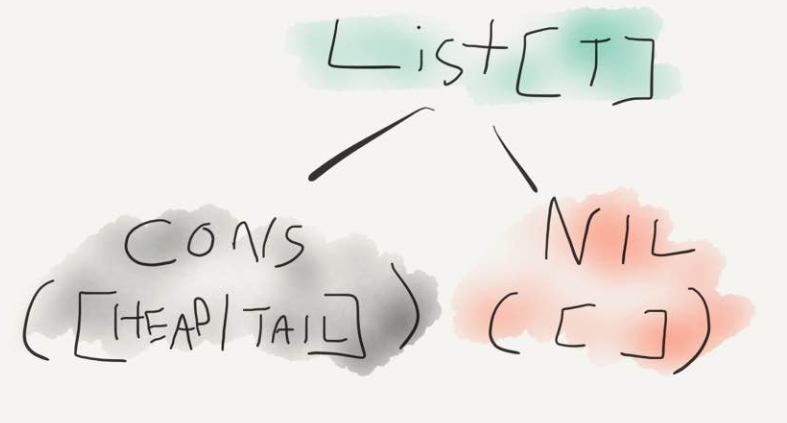 | |
| --- | |
| # List | |
| ``` | |
| list match { | |
| case head :: tail => println(s"cons cell with $head") | |
| case Nil => println("end of list!") | |
| } | |
| case list do | |
| [head | tail] -> IO.puts "cons cell with #{inspect head}" | |
| [] -> IO.puts "end of list!" | |
| end | |
| ``` | |
| ^ Even though these are expressed differently, a List still consists of a cons cell or a nil/empty list in both languages | |
| --- | |
| # Maybe/Option | |
| 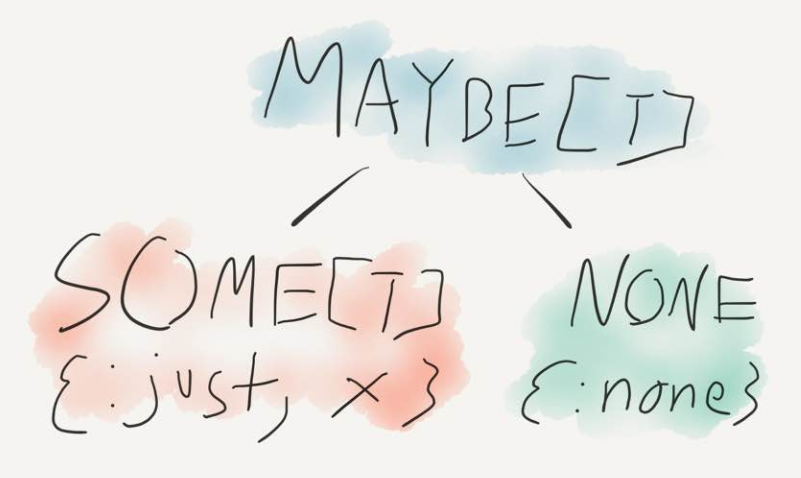 | |
| ^ Now this might look a bit strange to you if you're coming from ruby | |
| ^ Languages like java8, scala and haskell have this construct in their core | |
| ^ the idea is to create safety and eliminate null pointer exceptions | |
| ^ it moves the null effect to a type, and makes it explicit | |
| ^ you never actually return nil so there are no making mistakes | |
| --- | |
| # Maybe/Option | |
| ``` | |
| Option(maybeNullFun()) match { | |
| case Some(x) => println(s"got $x") | |
| case None => println("nothing!") | |
| } | |
| case maybeNullFun() do | |
| {:just, x} -> IO.puts "got #{inspect x}" | |
| {:none} -> IO.puts "nothing!" | |
| end | |
| ``` | |
| ^ Instead of returning nil you could put the result in a record | |
| ^ It becomes explicit that it can return a null | |
| --- | |
| # Try/Result | |
| 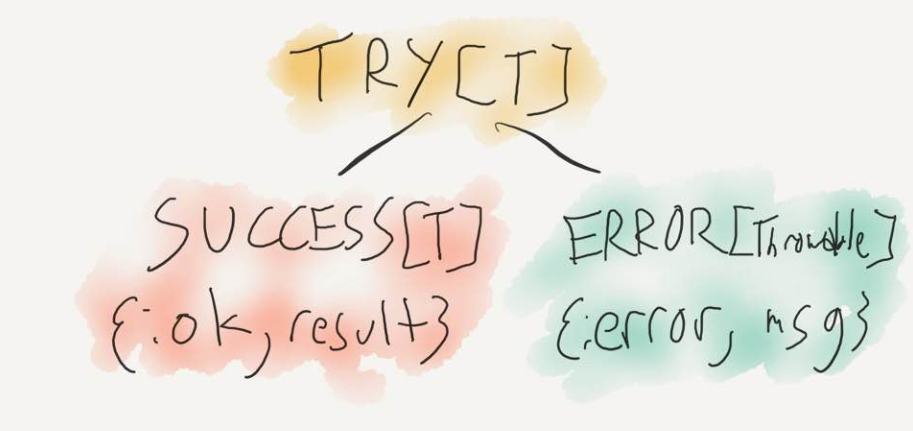 | |
| ^ | |
| --- | |
| # Try/Result | |
| ``` | |
| Try(dangerousFun()) match { | |
| case Success(x) => println(s"successfully got $x") | |
| case Failure(t: Throwable) => println(s"failed with $t") | |
| } | |
| case dangerousFun() do | |
| {:ok, x} -> IO.puts "successfully got #{inspect x}" | |
| {:error, msg} -> IO.puts "failed with #{msg}" | |
| end | |
| ``` | |
| ^ This is a more common record in elixir | |
| ^ in elixir we can represent a result in the same way, and we do this all the time | |
| --- | |
| # Data Pipelines are Assembly Lines | |
| - input |> validate |> transform |> respond | |
|  | |
| --- | |
| # Data Pipelines are Assembly Lines | |
| - input |> validate! |> transform! |> respond | |
|  | |
| --- | |
| # Pipes | |
| - Assumes value in/value out | |
| - Good for pure functions, or if throwing | |
| - Doesn't work well with our tagged tuples | |
| `input |> next_fun |> another_fun` | |
| --- | |
| # Example of Pipe w/ ADTs | |
| ``` | |
| path | |
| |> File.read() | |
| |> read_chunks() | |
| |> wrap() | |
| defp read_chunks({:ok, binary}) do | |
| {:ok, :beam_lib.chunks(binary, :abstract_code)} | |
| end | |
| defp read_chunks(error), do: error | |
| defp wrap({:ok, data}) do | |
| {:ok, wrap(data)} | |
| end | |
| defp wrap(error), do: error | |
| ``` | |
| --- | |
| # Railway Oriented Programming | |
| - Offers a solution to the previous example | |
| - Expands macros to handle errors and pass them along | |
|  | |
| --- | |
| # Railway Oriented Programming | |
| - Strings together a bunch of operations | |
| - If an error is encountered, processing "switches tracks" and passes error along. | |
|  | |
| --- | |
| # Railway Oriented Programming | |
| ``` | |
| 1511410370 | |
| >>> DateTime.from_unix # {:ok, #DateTime<...>} | |
| >>> Timex.format("{ISO:Extended}") # {:ok, "2016-02-29T12:30:30.120+00:00"} | |
| "bad" | |
| >>> DateTime.from_iso8601 # {:error, :invalid_format} | |
| >>> Whatever.function # ^^^ passed along | |
| ``` | |
| --- | |
| # Problem with Pipe and RoP | |
| - Simple, easy to use and understand but... | |
| - Limited to certain contracts | |
| - Poor composability!! | |
| --- | |
| # Composability: Consider... | |
| - Building a bank account status page: | |
| - Get user account from user id | |
| - Get checking account | |
| - Get savings account | |
| 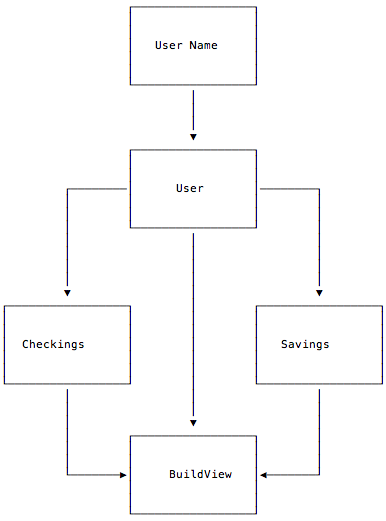 | |
| ^ Go get one thing, then get two more things with the result, then return all three of the results | |
| --- | |
| # Monads | |
| > Monads have also been explained with a physical metaphor as assembly lines, where a conveyor belt transports data between functional units that transform it one step at a time. | |
| -- Wikipedia | |
| ^ A category of a type | |
| ^ "higher kinded type" | |
| ^ User class is to User object, as Monad is to Try, Maybe, etc | |
| --- | |
| # Monads in Pictures | |
| - Google "monads in pictures" | |
| http://adit.io/posts/2013-04-17-functors,_applicatives,_and_monads_in_pictures.html | |
| --- | |
| # Monads | |
| - informally: category of a type which has "bind" aka "flatmap" | |
| - flatmap can chain together a bunch of monads | |
| - Like "RoP," will pass any "bad" result along | |
| --- | |
| # Maybe.map | |
| - `maybe.map(x => x+3)` | |
|  | |
|  | |
| --- | |
| # What if map returns a wrapped value?? | |
| - `maybeNumber.map(x => maybeHalf(x))` | |
|  | |
| --- | |
| # Flatmap in Monads | |
| - Monads apply a function that returns a wrapped value to a wrapped value. | |
| - maybeNumber.flatMap(x => maybeHalf(x)).flatMap(x => maybeHalf(x)) | |
| 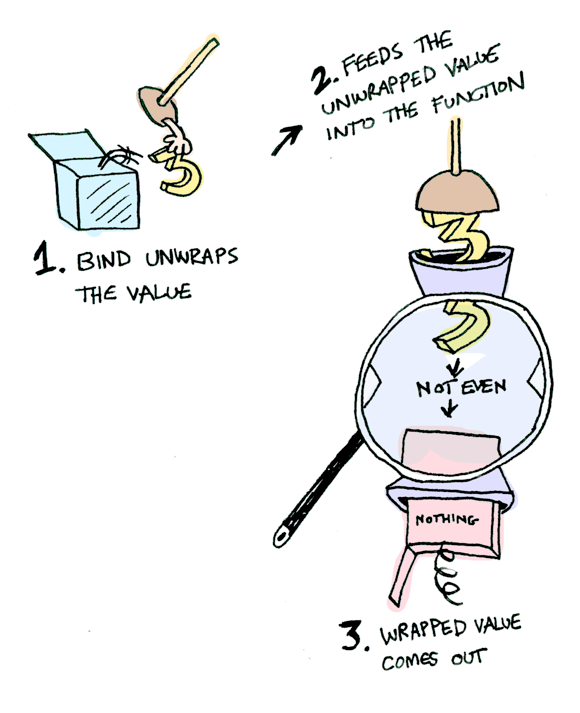 | |
| --- | |
| # Remember our earlier example? | |
|  | |
| --- | |
| # (horrible) Try Monad in Scala | |
| ``` | |
| getUser(username). | |
| flatMap(user => | |
| getCheckingAccount(user.id). | |
| flatMap(checkings => | |
| getSavingsAccount(user.id). | |
| map(savings => | |
| makeOrder(user, checkings, savings)))) | |
| //Try[(User, Acct, Acct)] | |
| ``` | |
| ^ We take user and flatmap will "unwrap it" | |
| ^ we can get a "wrapped" checkings account with the unwrapped user and put it off to the side for later | |
| ^ then use the user to get the savings account | |
| ^ then we can call make order which gives us another try | |
| ^ flat map will handle all unwrapping all of the containrs so we end up with our result in a one container | |
| --- | |
| # Try in Scala rewritten with Comprehension | |
| ``` | |
| for { | |
| user <- getUser(username) | |
| checkings <- getCheckingAccount(user.id) | |
| savings <- getSavingsAccount(user.id) | |
| } yield makeOrder(user, checkings, savings) | |
| //Try[Order] | |
| ``` | |
| --- | |
| # 'WITH' - NO 'M' WORD! | |
| - Looks very similar to scala comprehensions of monads! | |
| ``` | |
| with {:ok, user} <- get_user(username), | |
| {:ok, checkings} <- get_checking_account(user.id), | |
| {:ok, savings} <- get_savings_account(user.id) | |
| do | |
| {:ok, make_order(user, checkings, savings)} | |
| else | |
| {:error, _} -> {:error, "failed to build order!"} | |
| end | |
| ``` | |
| ^ handles :ok/:error in processing pipeline | |
| ^ passes errors through (good parts of RoP) | |
| ^ handles multiple response structures if needed | |
| ^ composability! | |
| --- | |
| # Asynchronous Composition! | |
| - account example expects synchronous responses | |
| ``` | |
| with | |
| {:ok, user} <- get_user(username) | |
| checking_task <- Task.async(fn -> get_checking_account(user.id) end) | |
| savings_task <- Task.async(fn -> get_savings_account(user.id) end) | |
| {:ok, checkings} <- Task.await checkings_task, | |
| {:ok, savings} <- Task.await savings_task, | |
| do: {:ok, make_order(user, checkings, savings)} | |
| ``` | |
| --- | |
| # COME WORK WITH ME! | |
| - [email protected] | |
| --- | |
| # A Linked List is an ADT | |
| ``` | |
| List("ok") match { | |
| case x :: tail => println("cons cell") | |
| case Nil => println("empty list") | |
| } | |
| ``` | |
| # Equivalent in Elixir | |
| ``` elixir | |
| def iterate([head | tail]), do: iterate tail | |
| def iterate([]), do: # done! | |
| case Repository.insert record do | |
| {:ok, result} -> # happy path | |
| {:error, msg} -> # error path | |
| end | |
| ``` | |
| ^ Pattern matching is a core language feature in all functional languages | |
| ^ Algebraic data types is just a term used to describe categories of types | |
| ^ In elixir this is usually represented as a tuple of :ok and :error | |
| ^ You could think of a list also being either a cons cell with a value and a reference to another list, or an empty list. | |
| ^ You could think of nil vs not nil as categories as well | |
| ^ Elixir doesn't have ADTs, but we can envision the same semantics | |
| ^ example ^ for example DateTime.from_unix(4) DateTime.from_iso8601("b") | |
| # ADT Example | |
| - Example of an ADT implemented in Elixir with `algae`` | |
| ``` | |
| defmodule Maybe do | |
| defsum do | |
| defdata Nothing :: none() | |
| defdata Just :: any() | |
| end | |
| end | |
| Maybe.new() | |
| #=> %Maybe.Nothing{} | |
| ``` | |
| ^ Some people have tried to introduce ADTs into elixir | |
| ^ It's not impossible, but just not idiomatic | |
| # Level Set: Immutability | |
| ``` elixir | |
| x = 1 | |
| my_fn = fn() -> x end | |
| x = 2 | |
| 1 = my_fn.() # matches! | |
| ``` | |
| ^ ^^ my_fn.() returns 1! | |
| ^ Elixir supports name rebinding but the original variable x is not mutated | |
| ^ This is a bit less important - going to talk a lot more about the ADTs or "categories" of things and how to compose them together in elixir | |
| # Problem 1: Single Possibly Null Value | |
| > I call it my billion-dollar mistake. [...] I was designing the first comprehensive type system for references in an object-oriented language. My goal was to ensure that all use of references should be absolutely safe, with checking performed automatically by the compiler. But I couldn’t resist the temptation to put in a null reference, simply because it was so easy to implement. This has led to innumerable errors which have probably caused a billion dollars of pain and damage in the last forty years. | |
| – Tony Hoare, Inventor of ALGOL W. | |
| ^ You guys are used to seeing :ok and :error atoms so I'm going to demonstrate most of this processing with nil/not nil to get you to think more laterally about processing data | |
| ^ for example DateTime.from_unix(4) DateTime.from_iso8601("b") | |
| # Option/Maybe and ADTs | |
| - draw a picture here | |
| # Option/Maybe in Scala | |
| ``` scala | |
| val x = Option(maybeNull) // produces either Some(value) or None | |
| .getOrElse(default) // returns the value in Some or default if None | |
| ``` | |
| - method declaration explicit about null return type | |
| - expresses the null _effect_ as a type for safety | |
| # Simple "Maybe" Idiom in Elixir | |
| ``` elixir | |
| x = maybe_nil || default | |
| ``` | |
| - Rubyism - `"bob"` is not equivalent to `true` in most languages | |
| - Works in elixir because nil is falsy and references are truthy | |
| # Problem 2: Explicit Some/None Return Value from One Function | |
| - or Success/Failure (:ok/:error) | |
| - or whatever categories of result! | |
| # Scala Option Result Type | |
| ``` | |
| def getUserFromDatabase(username: String): Option[User] = ??? | |
| getUserFromDatabase(username) match { | |
| case Some(user) => user | |
| case None => User(username) | |
| } | |
| ``` | |
| - Explicit null possibility expressed in type signature | |
| ^ Probably looks familiar to you if you're working with elixir | |
| ^ Except you know with certainty that this can return a null | |
| # Getting there With Elixir | |
| - Earlier example is not enough `x = maybe_nil || default` | |
| - Want to express "categories" of responses | |
| # Simple Algebraic Data Types | |
| - Express "categories" of types/responses | |
| - eg. Some or None, Success or Failure | |
| # How do we get there with Elixir? | |
| - In elixir, common idiom is to use a tuple | |
| - try/success/failure: | |
| - `{:ok, result}` | |
| - `{:error, error_message}` | |
| - maybe/some/none: | |
| - `{:ok, greater_than_five_message}` | |
| - `{:none}` | |
| ^ I've already been hinting at this so this shouldn't be much of a suprise | |
| ^ But we're going to take this example a lot farther | |
| # In Use | |
| ``` | |
| def get_user_from_database(username), do: ... | |
| case get_user_from_database("bob") do | |
| {:ok, user} -> user | |
| {:none} -> %User{name: "bob"} | |
| end | |
| ``` | |
| - You see this a lot with failures instead of raising exceptions | |
| - `{:ok, result}` or `{:error, message}` | |
| ^ May be better than returning nil because it's very explicit that it can be null. | |
| ^ It's like raising vs responding with :ok | |
| # The problem with that | |
| - Lots of cognitive load | |
| - How do you chain together a bunch of operations? | |
| ``` | |
| input | |
| |> something_that_can_fail | |
| |> something_else_that_can_fail | |
| |> oh_snap | |
| ``` | |
| # Problem 3: Chaining Multiple Operations | |
| - Nothing demonstrated has been expressive enough... | |
| - We want to be able to chain, but gracefully handle multiple categories | |
| ``` elixir | |
| res = input | |
| |> something_that_can_fail | |
| |> something_else_that_can_fail | |
| case res do | |
| {:ok, result} -> ... | |
| {:error, msg} -> ... | |
| {:none} -> ... | |
| end | |
| ``` | |
| # "Railway Oriented Programming" | |
| - Appropriated term... | |
|  | |
| # "Railway Oriented Programming" | |
| - Once you "switch tracks" you don't go back | |
|  | |
| # Depends on those Algebraic Data Types | |
| ``` | |
| defmacro left >>> right do | |
| quote do | |
| (fn -> | |
| case unquote(left) do | |
| {:ok, x} -> x |> unquote(right) | |
| {:error, _} = expr -> expr | |
| end | |
| end).() | |
| end | |
| end | |
| ``` | |
| # Railway Oriented Example | |
| ``` elixir | |
| @doc "will return {:ok, notification} or {:error, error_msg}" | |
| def email_notification(notification_id) do | |
| get_notification_details notification_id | |
| >>> validate_notification | |
| >>> send_email | |
| >>> mark_sent | |
| end | |
| ``` | |
| - Better than pipes for error handling! | |
| # Better... but... | |
| # Where it falls over | |
| - Cannot compose! | |
| - To make `Order`, Amazon needs: | |
| - `User` | |
| - `Shopping Cart` | |
| - `Shipping Address` | |
| ^ can you see the problem with this? | |
| # Problem 4: Chain and Compose Results that can Fail | |
| - Often can't just pipe output from one method into another | |
| ``` | |
| {:ok, user} = getUser(username) | |
| {:ok, cart} = getCart(user.id) | |
| {:ok, address} = getAddress(user.id) | |
| {:ok, order} = createOrder(user, cart, address) | |
| ``` | |
| # Don't Fear the Monad... | |
| > Monads have also been explained with a physical metaphor as assembly lines, where a conveyor belt transports data between functional units that transform it one step at a time. | |
| -- Wikipedia | |
| # Scala: Try Monad w/ Comprehension | |
| - Looks like railway oriented programming | |
| - But has more flexibility to compose results of operations | |
| ``` scala | |
| def order(username: String): Try[Order] = | |
| for { | |
| user <- getUser(username) | |
| cart <- getCart(user.id) | |
| address <- maybeGetAddress(user.id) | |
| } yield createOrder(user, card, address) | |
| ``` | |
| - returns `Success(order)` or `Failure(exception)` | |
| # And Elixir... | |
| ``` | |
| @doc "returns {:ok, order} or {:error, msg}" | |
| def create_order(username) do | |
| with {:ok, user} <- get_user(username), | |
| {:ok, cart} <- get_cart(user.id), | |
| {:ok, address} <- get_address(user.id), | |
| do: create_order(user, cart, address) | |
| end | |
| ``` |
Sign up for free
to join this conversation on GitHub.
Already have an account?
Sign in to comment